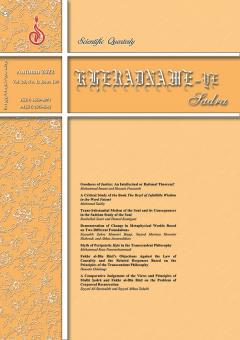A Comparative Judgement of the Views and Principles of Mullā Ṣadrā and Fakhr al-Dīn Rāzī on the Problem of Corporeal Resurrection
Subject Areas : Philosophers and philosophical schools influencing the Transcendent PhilosophySeyyed Ali Razizadeh 1 , Seyyed Abbas Zahabi 2
1 - PhD Candidate of Islamic Philosophy and Kalam, Faculty of Law, Theology and Political Sciences, Islamic Azad University, Science and Research Branch, Tehran, Iran
2 - Assistant professor, Philosophy Department, Faculty of Law, Theology and Political Sciences, Islamic Azad University, Science and Research Branch, Tehran, Iran
Keywords: corporeal resurrection, identical restoration of the non-existent, soul, immateriality of faculties, immateriality of imagination, Mullā Ṣadrā, Fakhr al-Dīn Rāzī,
Abstract :
Both Fakhr al-Dīn Rāzī and Mullā Ṣadrā believe in corporeal resurrection; however, they follow different approaches in this regard. A comparison of their views shows similarities in some of their principles but fundamental differences in some others. The origin of their difference is their philosophical principles and, particularly, the discussions of “identical restoration of the non-existent” and “immateriality of faculties”. The rational demonstration of Fakhr al-Dīn Rāzī’s corporeal resurrection was based on his belief in identity with the identical restoration of the non-existent, which has led to some incorrect conclusions such as the materiality of the immaterial dimensions of the soul in the process of resurrection. On the other hand, in contrast to Fakhr al-Dīn Rāzī’s claim as to philosophers’ lack of belief in corporeal resurrection, Mullā Ṣadrā tried to prove it philosophically for the first time. Although his philosophical approach gave rise to some criticisms against him, the same approach was the secret behind his immunity against repeating the same mistakes committed by mutikallimun, including Fakhr al-Dīn Rāzī. Mullā Ṣadrā rejected the theory of the restoration of the non-existent and believed in other worldly and not elemental corporeal resurrection. Therefore, to demonstrate the restoration of individuals’ acts, he did not have to resort to mutikallimun’s theory of the “return of dispersed components” of human beings. One of the other differences between the views of these two philosophers concerns the problem of the multiplicity and immateriality of faculties. Both thinkers believed in the immateriality of the soul, but Fakhr al-Dīn Rāzī maintained that soulish faculties lack multiplicity and tried to bring it in line with the idea of the identical restoration of the non-existent. However, Mullā Ṣadrā believed that the solution to the problem of corporeal resurrection, similar to many other problems, must be sought in the specific method of the soul’s knowledge, particularly, the immateriality of imagination. This paper aims to explain and evaluate the fundamental differences between the views of Fakhr al-Dīn Rāzī and Mullā Ṣadrā regarding the problem of corporeal resurrection.
قرآنكريم.
آملي، محمدتقي (1374) درر الفوائد، قم: اسماعيليان.
ابراهيمي ديناني، غلامحسين (1399) معاد، تهران: حكمت.
رفيعي قزويني، ابوالحسن (1367) مجموعه مقالات، تصحيح غلامحسين رضانژاد، تهران: الزهرا.
فخررازي، محمد بن عمر (1411ق/ الف) المحصل، عمان: دارالرازي.
فخررازي، محمد بن عمر (1411 ق/ ب) المباحث المشرقية في علم الالهيات و الطبيعيات، قم: بيدار.
فخررازي، محمد بن عمر (1986 م) الاربعين في اصول الدين، قاهره: مكتبة الكليات الازهرية.
مصباح يزدي، محمدتقي (1389) شرح الاسفار الاربعه، تحقيق محمد سعيديمهر، قم: مؤسسه» امام خميني (ره).
مطهري، مرتضي (1379) معاد، تهران: صدرا.
ملاصدرا (1378) المظاهرالاهية في اسرارالعلوم الكمالية، تصحيح و تحقيق سيدمحمد خامنهاي، تهران: بنياد حكمت صدرا.
ملاصدرا (1381) المبدا و المعاد، تصحيح و تحقيق محمدذبيحي و جعفرشاهنظري، تهران: بنياد حكمت اسلامي صدرا.
ملاصدرا (1382) الحكمةالمتعالية في الاسفار الاربعة، ج9، تصحيح و تحقيق رضا اكبريان، تهران: بنياد حكمت اسلامي صدرا.
ملاصدرا (1383) الحكمة المتعالية في الاسفارالاربعة، ج1، تصحيح و تحقيق غلامرضا اعواني، تهران: بنياد حكمت اسلامي صدرا.
ملاصدرا (1386) مفاتيحالغيب، تصحيح و تحقيق نجفقلي حبيبي، تهران: بنياد حكمت اسلامي صدرا.
ملاصدرا (1391) الشواهد الربوبية فيمناهج السلوكية، تصحيح و تحقيق سيدمصطفي محقق داماد، تهران: بنياد حكمت اسلامي صدرا.


